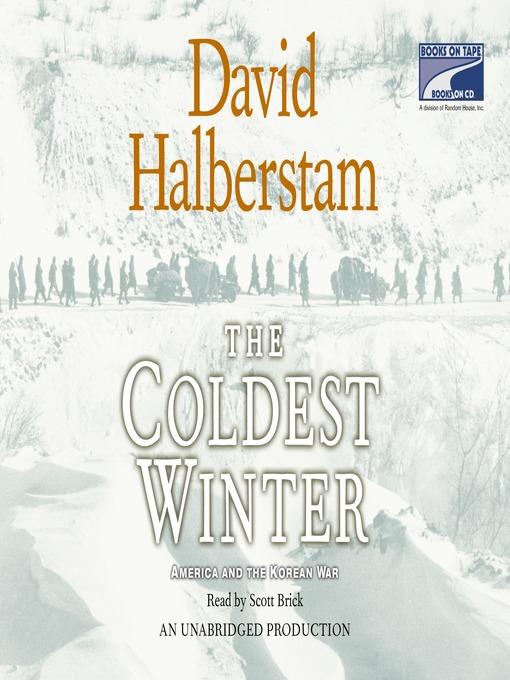
The Coldest Winter
America and the Korean War
کتاب های مرتبط
- اطلاعات
- نقد و بررسی
- دیدگاه کاربران
نقد و بررسی

The late, great David Halberstam has written a virtuoso tribute to "the forgotten war": Korea, early 1950s. This is much more than a history of the year in which the Chinese entered the war and almost pushed the South Koreans and Americans into the sea. Personalities and events parade across the narrative: generals, presidents, common soldiers, politics, and battles. And herein one also perceives why Scott Brick, with his middle-American voice, is recognized as such an outstanding narrator. An effective reader should disappear from a book such as this, leaving the listener without distraction. But Brick manages to add to the narrative with the increased intensity of his reading at all the appropriate moments. Nothing he does subtracts; everything he does adds. D.R.W. (c) AudioFile 2008, Portland, Maine

July 23, 2007
Reviewed by James Brady
At the heart of David Halberstam's massive and powerful new history of the Korean War is a bloody, losing battle fought in November 1950 in the snow-covered mountains of North Korea by outnumbered American GIs and Marines against the Chinese Communist Army.
Halberstam's villain is not North Korea's Kim Il Sung or China's Chairman Mao or even the Soviet Union's Josef Stalin, who pulled the strings. It's the legendary general Douglas MacArthur, the aging, arrogant, politically ambitious architect of what the author calls “the single greatest American military miscalculation of the war,” MacArthur's decision “to go all the way to the Yalu because he was sure the Chinese would not come in.”
Much of the story is familiar. What distinguishes this version by Halberstam (who died this year in a California auto crash) is his reportorial skill, honed in Vietnam in Pulitzer-winning dispatches to the New York Times
. His pounding narrative, in which GIs and generals describe their coldest winter, whisks the reader along, even though we know the ending.
Most Korean War scholars agree that MacArthur's sprint to the border of great China with a Siberian winter coming on resulted in a lethal nightmare. Though focused on that mountain battle, Halberstam's book covers the entire war, from the sudden dawn attack by Kim Il Sung's Soviet-backed North Koreans against the U.S.-trained South, on June 25, 1950, to its uneasy truce in 1953. It was a smallish war but a big Cold War story: Harry Truman, Stalin and Mao, Joe McCarthy and Eisenhower, George C. Marshall and Omar Bradley, among others, stride through it. A few quibbles: there were no B-17 bombers destroyed on Wake Island the day after Pearl Harbor, as Halberstam asserts, and Halberstam gives his minor characters too much attention.
At first MacArthur did well, toughing out those early months when the first GIs sent in from cushy billets in occupied Japan were overwhelmed by Kim's rugged little peasant army. MacArthur's greatest gamble led to a marvelous turning point: the invasion at Inchon in September, when he outflanked the stunned Reds.
After Inchon, the general headed north and his luck ran out. His sycophants, intelligence chief Willoughby and field commander Ned Almond, refused to believe battlefield evidence indicating the Chinese Communists had quietly infiltrated North Korea and were lying in wait. The Marines fought their way out as other units disintegrated. In the end, far too late, Truman sacked MacArthur.
Alive with the voices of the men who fought, Halberstam's telling is a virtuoso work of history. (Sept
.)
James Brady, columnist at
Parade and Forbes.com, is author of several books about Korea. His latest book is
Why Marines Fight (St. Martin's, Nov.).

























دیدگاه کاربران